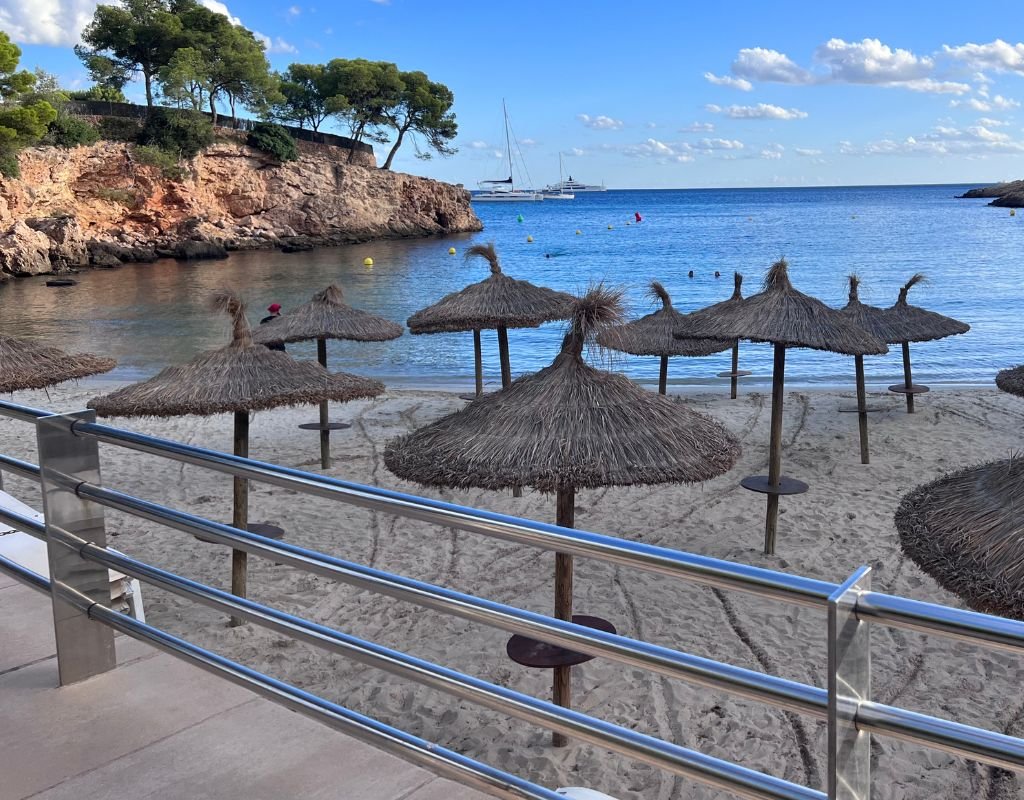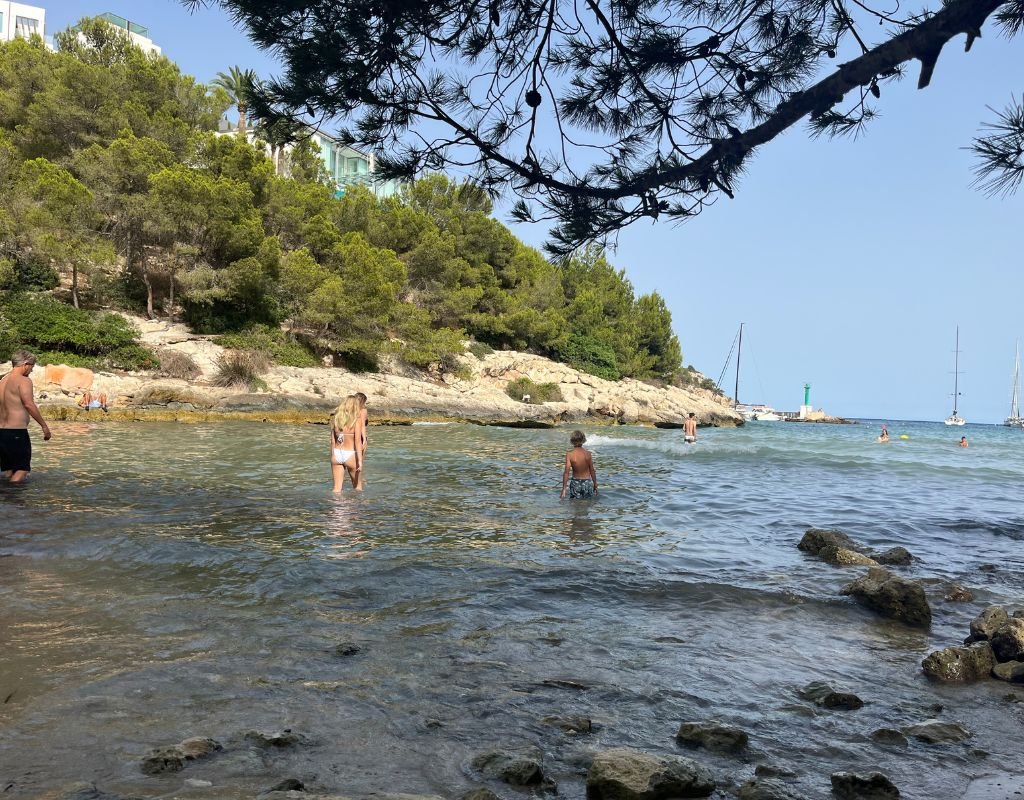Living in Spain in 2025: The Pros and Cons for Expats
|
Thinking about swapping your American lifestyle for the vibrant culture and laid-back vibes of Spain?
My family and I made the leap, and it’s been a transformational experience that gave us much more than just sunny days and delicious tapas.
Living in Spain has brought us peace of mind, significantly enhanced our quality of life, and has been instrumental in molding our children into well-rounded global citizens. In 2025, Spain offers a unique blend of old-world charm and modern living that attracts many expats from the USA.
Whether you’re drawn by the Mediterranean lifestyle or the rich cultural tapestry, it’s essential to weigh the pros and cons. From the undeniable appeal of the Spanish pace of life to the challenges of navigating local bureaucracy, understanding what life really looks like in Spain will help you make an informed decision.
If you’re feeling overwhelmed with the bureaucracy and all the hoops you seem to be jumping through to get your move to happen, check out my How to Move Abroad e-book to help you make the right decisions and make your transition as smooth as possible.
Let’s explore the benefits and drawbacks of becoming an expat in Spain, giving you a clearer picture of what to expect from life on the Iberian Peninsula.

Get Started Today!
How to Move Abroad
A Workbook to help you make the right choices
Use our easy to follow roadmap to help you find the perfect location to start your new life.

Pros of living in Spain
Here are some of the reasons why we love living in Spain so much!
Weather
Imagine basking in over 300 days of sunshine each year! Whether you love the balmy coasts of Andalusia or prefer the mild winters up north, you’ll find a climate that suits your preference perfectly in Spain, making it an ideal place if you love the sun.
Food
As a food lover, you’ll be in paradise. Spain’s rich culinary traditions mean you can indulge in tapas, paella, avocado toast and world-class wines right from their source. Each region offers its unique flavors and specialties, inviting you on a never-ending gastronomic journey that’s both affordable and deeply satisfying.
We also found that the kids adapted really well to the type of food eaten in Spain. Although food is served a lot later here, things are less processed and fruits and vegetables are locally produced.
Lifestyle
In Spain, life moves at a relaxed pace. Here, every day is meant to be savored—there’s always time for a mid-afternoon siesta or a leisurely evening stroll along picturesque streets with family and friends. This significantly reduced our stress levels and increased our overall happiness.
We also find that Spain feels extremely safe and that we can afford the kids more freedom and independence as a result. This has truly made all the difference for us.
Access to Europe
Living in Spain not only lets you immerse yourself in the local culture but also provides easy access to the rest of Europe. Fancy a weekend getaway to France, a road trip to Portugal, or a short flight to Italy? Spain serves as a perfect base for our European adventures. The flights are cheap and anywhere is under a 2 hour flight. It doesn’t get much better than that, frankly.

Rich culture with minimal culture shock
You’ll find that adapting to Spanish culture is smoother than you might expect. Not only do people dress similarly to what you’re used to back home, but the food is also close enough to Western cuisine to feel familiar yet excitingly different. Many of the religious celebrations will remind you of those in Western traditions, adding a sense of familiarity amidst the new experiences.
Alongside the warm, friendly nature of the Spanish people, these similarities will make it easy for you to feel right at home.
Low cost of living
Compared to many parts of the USA, you’ll find Spain offers a more affordable cost of living. Daily expenses, food, housing, and entertainment cost less, allowing you to live comfortably without breaking the bank. We more than halved our expenses when we moved to Spain from the United States.
Excellent Healthcare
You’ll have access to one of the best healthcare systems in the world, known for its high standards and accessibility. Both public and private healthcare options provide comprehensive coverage, ensuring you and your family peace of mind.
You’ll also find that private health care really doesn’t cost that much compared to US standards. We pay less for our family in Spain than we did in the United States and the care has been fantastic!


Great transportation
Getting around is a breeze thanks to Spain’s well-organized public transport system. High-speed trains, extensive bus networks, metro, ferries and affordable domestic flights make it easy for you to explore both city and countryside for very little.
And if you choose to settle in the Balearic Islands, flights are practically free to the mainland since residents only pay the taxes! Another perk in Spain is how cheap Uber is compared to Western countries. This is really the best way to get around large cities since you don’’t need to worry about parking or traffic.
We have a car but we almost NEVER use it unless we are headed on an out of town surf or ski trip.
Pets are welcome
Spain is a fantastic place for your furry friends too! Most restaurants and cafes with terraces welcome well-behaved pets on a leash, so you can enjoy dining out without having to leave your pets at home. Additionally, you’ll find that parks often provide doggie bags, encouraging everyone to keep the sidewalks and our shoes clean. Check out our post on how we got our beloved Labrador Mo to Spain!
Banking is straightforward
Opening a bank account in Spain is pretty easy, even if you aren’t a resident. I know a lot of people who opened a non-resident bank account as soon as they arrived, and found it simpler to set up than a resident account!
Keep in mind that non-resident accounts are less flexible and offer fewer benefits than resident accounts, and are only a viable option if you spend less than 183 days per year in Spain. Once you become a resident, you can switch to a resident account which you’ll need for a rental agreement and to pay your utilities.

Cons of living in Spain
Bureaucracy
Navigating the Spanish bureaucracy can be one of the more daunting aspects of your move. From obtaining residency to registering for healthcare, the process often involves a maze of paperwork and can be time-consuming.
Patience and persistence are key as you adjust to the slower administrative pace. We found this hard, and have used a service and even a lawyer to help us with paperwork a few times. We didn’t find it overly expensive, and the time and stress it saved me personally was really worth it. Definitely something to consider!
Summer shut down
When you’re used to the non-stop hustle of American life, Spain’s summer shutdown can be a frustrating surprise. In August, many businesses, shops, and restaurants close as locals take their long vacations. This can be inconvenient if you’re trying to get things done, have construction on the go or are in need of specific services during this time.
I personally found the daily afternoon shutdown between 1 pm and 4 pm hard to adjust to as well. Sometimes you really don’t have a choice but to get it done tomorrow instead.
Language barrier
While many Spaniards speak English, especially in larger cities and tourist areas, a lack of Spanish or Castiliano language skills can limit your interactions and complicate everyday tasks in more rural or less touristy areas. And even if you already speak Spanish, there are variations between what is spoken in Mexican, South America and Spain.
Spain is one of the European countries which is the least linguistically open when it comes to English or even just having a foreign accent. This is partly due to the fact that movies are all dubbed in Spain, so the population has less exposure to English and foreigners speaking Spanish. Depending on which part of Spain you choose to live in, you may have to contend with Catalan, Basque or Galician as well as Castiliano.
Around Barcelona and on the Balearic Islands, schools teach both Catalan and Castiliano. The locals are very proud of being Catalan, and delicate political issues are closely tied to the language, so step lightly.
Most don’t expect foreigners to learn Catalan, but really appreciate any Castiliano you can muster. You’ll find that once you speak Castellano well enough, you’ll be able to understand Catalan too.
My kids were fluent in less than a year so the immersion is a fantastic way to learn Spanish.

Unemployment
Spain has historically had higher unemployment rates compared to other European countries. This could affect your job prospects or the stability of your employment here, especially if you are looking for work outside of international companies or the major tourist sectors.
It’s also worth considering that the average wage in Spain is one of the lowest in Europe, at around 2000€. This is why it is often recommended that expats arrive with a remote job if possible.
Political strife
Spain is not without its political challenges, which can impact your experience as an expat. One of the big issues is the ongoing strife in Catalonia, where there is a strong movement for independence from the rest of Spain.
This movement stems from cultural, economic, and historical grievances, and it often fuels a sense of unease in both local and national politics. As an expat, you might find yourself caught in uncomfortable situations during dinner parties, where any opinion on the topic can lead to tense discussions.
Staying informed and sensitive to this dynamic is crucial, but staying out of it is even better!
Different schedules
The Spanish schedule is quite different from what you may be accustomed to, and adjusting to this new rhythm can take some time. Mornings often stretch until 1 pm, with siesta, the traditional midday break for lunch, lasting until about 4 pm. During this time, many shops close and streets can be quieter as people retreat home to eat and rest.
Shops typically reopen around 4-5 pm and remain open until 7 ish. Dinner only begins after this, sometimes not served until midnight, which shifts the entire day’s schedule later into the evening. This late-night culture also affects bedtime for children, who often go to sleep between 9 and 10 pm, although schools generally start later, around 9 am.


So Is Spain a Good Place to Live?
We definitely think so! Spain has offered us a lifestyle filled with wonderful weather, delicious food, and a relaxed pace that we’ve come to cherish. The healthcare is top-notch, and living costs are manageable, which has made it easy for us to enjoy this vibrant culture without stretching our budget.
However, it hasn’t been without its challenges. Navigating the bureaucracy was more cumbersome than we anticipated, and adapting to the local schedule took some time. Plus, there are moments when the language barrier presents a hurdle, despite many locals speaking English.
But for our family, the benefits far outweigh the drawbacks. We love the safety here; our kids are happy and thriving and say they never want to move back to the United States! Moving to Spain was exactly what we were looking for—it has enriched our parenting style, our lives and broadened our perspectives in ways we never imagined.
Here are a few more considerations you’ll need to think about before making the leap.
How much money do you need to live comfortably in Spain?
Living comfortably in Spain can vary widely depending on the city and your lifestyle, but here’s a general idea of what you might expect:
Examples of Living expenses in Spain
To live comfortably in Spain, it’s helpful to understand the typical costs. For couples, having a combined monthly income of between 4,000 and 5,000 euros each provides a decent standard of living.
If you’re living on your own, you might need closer to 2,500-3,000 euros per month, especially considering that rent for a one to two-bedroom apartment can range from 900 to 1,500 euros, depending on the location and amenities.
Food generally costs about 80 Euros per week per person and utilities like electricity, water and internet will go for about 250-300€ depending on how much heating/air conditioning you use.


Should I Rent or Buy property in Spain?
When it comes to housing, whether you rent or buy can make a big difference in your expenses. Renting in major cities like Madrid or Barcelona can be pricey, and purchasing property might ultimately be more cost-effective. The government also encourages foreign investment and makes it fairly easy for foreigners to buy property.
You’ll find that homes are very affordable outside of big cities, and that mortgage payments are generally lower than rent. Buying can definitely be a wise investment if you plan to stay long-term
Should I Get Private HealthCare for Expats in Spain?
Spain is renowned for its excellent healthcare system, which is among the best in Europe. As an expat living here, you’ll find both public and private healthcare options available, each offering high-quality medical services.
Public Healthcare
Once you register with the social security system in Spain, you gain access to the public healthcare system, which is funded by the government. This means minimal costs at the point of service for everything from routine doctor’s visits to emergency procedures and long-term treatments. The care provided is comprehensive and generally of high quality, with well-equipped facilities and highly trained medical staff.
Private Healthcare
Many expats choose to supplement their coverage with private insurance. Private healthcare in Spain allows for shorter waiting times and access to a broader network of specialists. Additionally, private hospitals often offer services in English, which can be a significant advantage if your Spanish isn’t fluent. The cost of private health insurance is relatively affordable compared to the US, with many plans tailored specifically to expats.
Ideally, I recommend you find a doctor who works in the public system who also has a private practice. They will know how to navigate both systems and assist you in using both in the best way possible with minimal wait times and expenses.
We have had nothing but excellent medical care since arriving in Spain and the system has been easy and straightforward to navigate.

What type of School should I choose?
Moving to Spain with children means navigating a new education system. Here, you have several options depending on your preferences and the needs of your family.
Public Schools
Public schools in Spain are free and provide education to all children living in Spain, regardless of nationality. Classes are generally conducted in Spanish, and in regions with two official languages, such as Catalonia or the Basque Country, instruction may also be in the regional language.
Public schools offer a solid standard of education and are a great way for your children to become fully bilingual and integrate into the local community.
Concertadas (Semi-Private Schools)
Concertadas are semi-private schools that are partially funded by the government. They charge lower fees than private schools and often offer bilingual curriculums, with instruction in Catalan, Castilian Spanish, and English.
These schools can be an excellent middle ground for families looking for a more international environment without the higher cost of fully private education.
Private and International Schools
Private schools in Spain cater to a variety of educational philosophies and curriculums, including British, American, and International Baccalaureate (IB) programs. They typically charge higher fees, ranging from 250 to 500 euros per month.
International schools, however, offer curriculums in languages other than Spanish and focus heavily on preparing students for universities abroad. Expect tuition fees at these schools to be higher, generally between 800 and 1,200 euros per month.
Choosing the right school will depend largely on the length of your stay in Spain, your location, and your children’s adaptability to new language environments. Each type of school offers different benefits, from immersion in local culture and language at public schools to more familiar curriculums and languages at international schools.

The Best places to live in Spain
Choosing where to live in Spain can greatly influence your expat experience. Whether you’re looking for vibrant city life, tranquil seaside towns, or something in between, Spain offers quite a range of options. Here are some of my top picks:
Valencia
Known for its innovation and vibrant cultural scene, Valencia is a favorite if you crave a mix of traditional and modern living. The city has beautiful beaches, a thriving arts and sciences complex, and an affordable cost of living compared to other major Spanish cities.
Sitges
Just a short drive from Barcelona, Sitges offers a laid-back coastal lifestyle with its stunning beaches and active nightlife. It’s particularly popular among the LGBTQ+ community but families love it here too. It’s a great option if you’d like a village life by the beach, but with just enough action and a short train ride to Barcelona.
Malaga
Located in the heart of the Costa del Sol, Malaga is not only rich in history and culture but also offers a warm climate year-round. Its revitalized historic center and newly arrived digital nomads make it an attractive spot for both retirees and young professionals. Malaga sees a lot more tourists than other parts along the coast, so if the beach life is what you’re looking for – this is where you want to be.
Mallorca
For those looking for island life, Mallorca provides a stunning backdrop with its beautiful landscapes and crystal-clear waters. The island caters to a luxury lifestyle but also offers rustic charm in its mountain villages and beautiful quiet coves. Mallorca is excellent for families and although a little more expensive than the mainland, has fabulous options worth checking out.
San Sebastian
Famed for its culinary scene, particularly the dense concentration of Michelin-starred restaurants, San Sebastian is perfect for food enthusiasts. Its beautiful beaches and vibrant festivals offer a high quality of life in the Basque Country. It is definitely colder than Spain’s south coast, so keep this in mind and if you are not a fan of rain this is not your place.
Barcelona
A top choice for many expats, Barcelona offers a dynamic urban environment with its famous architecture, extensive nightlife, and diverse international community. The city is also a hub for entrepreneurship and creative industries. We found Barcelona to be a little too busy for our taste, but the international scene here is undoubtedly the best in Spain and not quite as transient as Mallorca.
Madrid
As the capital, Madrid provides a bustling metropolitan lifestyle with endless cultural activities, from world-class museums to historical sites. Madrid is one of the best options for expats considering its numerous advantages. The city is known for its excellent schools, offering top-notch education options for families.
Its extensive public transportation system is also among the best in Europe, making it incredibly easy to navigate the city and explore its rich cultural heritage. The people in Madrid are also known for their open and welcoming nature, adding to the city’s appeal as a vibrant and friendly place to live.
However, it’s worth noting that the summer heat can be quite intense, which might be a deal breaker if you’re not accustomed to very warm weather.


How Can I Get Residency in Spain?
Getting residency in Spain is a critical step if you’re looking to settle down and enjoy the full benefits of living in Spain. Here’s a breakdown of the key pathways and tips for getting your residency as quickly as possible:
Non-Lucrative Visa
If you’re not planning to work in Spain, the non-lucrative visa is a popular option. This visa requires proof of sufficient financial resources to live in Spain without working, including comprehensive health insurance coverage. This means you need to prove you receive about 30,000 Euros in income. It’s ideal for retirees or those who can work remotely for companies outside of Spain.
Work Visa
If you intend to work in Spain, you will need a work visa. This usually requires a job offer from a Spanish company, which must sponsor your application. The process involves coordination between you, your employer, and Spanish immigration authorities to ensure all criteria are met.
Golden Visa
Investing in Spain can also lead to residency. The Golden Visa program offers residency permits to non-EU nationals who make significant investments, such as purchasing real estate worth at least €500,000. This visa is particularly attractive as it offers a path to long-term residency and eventual citizenship.
Student Visa
For those looking to study in Spain, a student visa can be a great entry point. It allows you to live in Spain for the duration of your course and often includes permission to work part-time.
Family Reunification
If you have family members who are residents or citizens of Spain, you may apply for residency through family reunification. This process typically involves proving the family relationship and the resident’s ability to support you. My elderly mom moved to Spain to join us and this Visa made that process easy.
Renewal and Long-Term Residency
Once you have lived in Spain for five years on a legal residency permit, you can apply for long-term residency. This status allows you to live and work in Spain indefinitely, under similar conditions as Spanish citizens.
Tips for a Smooth Application
- Make sure all your documents are correctly translated into Spanish and notarized.
- Keep your ears open for any changes in immigration law.
- Consider consulting with a local immigration lawyer or a relocation expert to navigate the process more smoothly. We have a few favorites so feel free to reach out for a recommendation.
Most North Americans hire a relocation expert to help them with the process and find it’s definitely worth the money and the hasslefree experience.

Living in Spain in 2025: The Wrap-Up
From our own journey, we’ve discovered that moving to Spain offers a blend of incredible benefits and some challenges too. The warm climate, great food, and the relaxed lifestyle have significantly enhanced our family’s quality of life. Our children are thriving and we’ve found peace and happiness in the local culture.
However, the complexities of bureaucracy, the crazy summer heat, and the shift in schedules definitely threw us for a loop! Keeping an open heart and preparing ourselves for some discomfort allowed us to make the most of living in this beautiful country. I hope this inspires you to do the same!

Get Started Today!
How to Move Abroad
A Workbook to help you make the right choices
Use our easy to follow roadmap to help you find the perfect location to start your new life.
Hello and Welcome!

We started our family travel blog in hopes of supporting other families move abroad and travel the world. Through straightforward, sincere and supportive information we hope to provide a reliable guide for those moving overseas with a family and traveling the globe.





